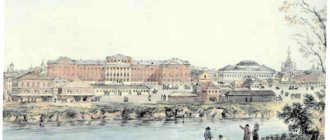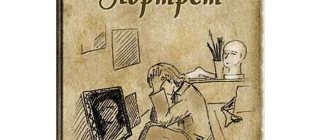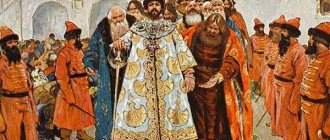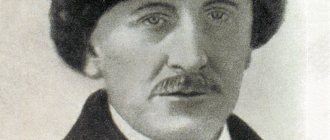While in exile, A. S. Pushkin carefully studied Karamzin’s “History of the Russian State,” which prompted him to create the historical work “Boris Godunov.” This tragic drama describes the reign of Boris Godunov and the rise to power of False Dmitry. According to the Soviet literary critic and Pushkin scholar Sergei Mikhailovich Bondi, the main character of “Boris Godunov” is the people. Pushkin reliably conveyed historical events, where the masses of the people play a large role, their influence on the despotic rule of the authorities.
Main characters
Tsar Boris Godunov
In "Boris Godunov" the hero is the Tsar of All Rus', the wisest ruler and experienced politician, but a man who has never been able to earn the gratitude and trust of his people. A powerful and strong man, he strove to streamline the life and well-being of his subjects, but the masses could not find justification for the murder of the prince and the policy of serfdom, which, in fact, was the cause of his tragedy. From the story of Pushkin Afanasy Mikhailovich it follows that Tsar Boris Godunov is the cause of all the misfortunes that befell the Russian people.
Grigory Otrepiev
A former monk from the Chudov Monastery, a young man of 20 years old, an adventurer by nature. Influenced by conversations with his mentor Pimen, he decided to proclaim himself Tsar Dmitry, who was killed by Godunov. Otrepyev was tired of monastic life and wanted royal greatness. A young adventurer with the gift of persuasion, he managed to win over the Polish-Lithuanian state, gathered an army, and went to win power from Boris Godunov. He managed to achieve his goal, and remained on the royal throne for about a year, until he died as a result of a political conspiracy.
The image of Boris Godunov in Pushkin’s tragedy “Boris Godunov”
Mainly in Alexander Pushkin's play Boris Godunov
"is
the people
. But the image of the king is also important, since it is he who is opposed by the people’s power. Boris Godunov is the Tsar of Moscow, who replaces the failed ruler Fedor.
The author reveals the image of Boris Godunov comprehensively and colorfully. We see him both as a king and as an ordinary person, a family man. He is a controversial personality with many spiritual qualities.
Pushkin
emphasizes that Boris Godunov has many good traits. This is his intelligence, his strong will, and his ability to sympathize with loved ones. When his daughter is widowed, he worries about her.
Godunov understands well that education benefits the state and therefore sends young people abroad to study. He is also pleased with his son’s academic success.
As an experienced politician, Godunov sees the difficult situation in the country and the fact that many boyars are opposed to him. He is trying to appease the people with his “favors.” In order to strengthen ties with Western countries, the king gives his daughter in marriage to the Swedish prince. In his will, Godunov leaves smart advice on governing states to his son.
But the tsar’s efforts are undone by a series of failures: crop failure, fire. He acts in the style of all autocrats - he increases extortions from the people. People begin to be indignant and accumulate anger towards their king.
Boris Godunov is not an innovator in the field of politics, but according to the tradition of the autocratic system, he concentrated all power in his hands. He also continued the fight against disgruntled boyars. The king saw support only from the serving nobility. When appointing an army commander, Godunov took into account not the nobility of the family, but the intelligence of the candidate. And the choice fell on Basmanov, who was famous for his intelligence.
To pacify the people, the king acted strictly and mercilessly. This was the only way to contain popular discontent, he thought. Boris finally strengthened serfdom. And now the serfs did not even have the right to move at will from one owner to another. After this, the people began to treat the king with hostility.
But the worst thing is that Boris came to power illegally. By his order, they get rid of the young Tsarevich Dmitry. A rumor about this later leads to the appearance of an impostor who will try to take the throne from the king as the rightful heir.
Godunov himself also suffered from remorse. The thought of what price he had to pay for the throne caused him mental anguish. But ambition turned out to be higher than his conscience.
Boris Godunov has a tragic fate, and not only because he came to power the wrong way, but also because he did not have the support of the nobles, boyars, and Cossacks. And most importantly, the people did not like him. People saw him as a tyrant who tightened the exactions and consolidated the serfdom of the landowners. And those small favors that the king showed them, the people perceived as a pathetic handout and a method to remain on the throne.
The image of Boris Godunov is the image of a typical autocrat of that time, who ends his reign tragically because he does not take into account the importance and strength of the people.
Did you like your school essay? And here's another:
The image of Prince Shuisky in Pushkin’s tragedy “Boris Godunov” The image of Pimen in Pushkin’s tragedy “Boris Godunov” The image of Grishka Otrepyev in Pushkin’s tragedy “Boris Godunov” The image of Marina Mnischshek in Pushkin’s tragedy “Boris Godunov”
The image of the hero in the work
(Scene from Act 2 of the opera, Bolshoi Theatre, 1948)
Although the title of the drama is “Boris Godunov” and the tsar is the central figure in the story, the author does not assign the main role to him. It rightfully belongs to the people, the driving force of Russian history. An attempt to break the will of people, to manipulate it for the sake of one’s own interests ends in destruction for the Godunov family.
Throughout his reign, pangs of conscience haunt the hero, gradually driving him crazy. The fear of exposure latently changes his character. A connoisseur of science and a lover of the people, he is carried away by superstitions and gives the go-ahead for the resumption of executions and torture. Pushkin presents the mental torment of his hero as atonement for the crime committed. The scene before his death evokes compassion in the reader.
Methodological development of the lesson “B. Godunov in the assessments of Pushkin and Karamzin”
B. Godunov in the assessments of Pushkin and Karamzin
Lesson type: integrated.
Lesson time: 1 class hour.
The purpose of the lesson: to characterize the personality and evaluate the policies of the first elected Tsar of Russia.
Tasks:
Educational:
- Forming an idea of the historical portrait of Boris Godunov, the problems of his reign associated with the period of the Time of Troubles.
- Developing an opinion about the inconsistency of Godunov’s personality, as well as the features of the artistic image of Tsar Boris, created by N.M. Karamzin in “History of the Russian State” and A.S. Pushkin in the drama “Boris Godunov”.
Educational:
- Developing a sense of respect for the historical and cultural past of your state.
- Formation of students' ideas about the positive and negative qualities of a person.
Educational:
- To promote the development of communication skills, the ability to work with various types of sources, skills of historical analysis and analysis of a work of art.
- Formation of key competencies: the ability to work in a group, the ability to communicate, the ability to lead a discussion, to defend one’s point of view with reason, to respect the opinions of classmates.
Forms of organizing educational activities: individual, collective.
Types of student work in class:
- Work in a group and individually.
- Advance homework.
- Working with concepts.
- Working with the textbook and additional literature.
- Conversations with students.
- Working with a notebook.
- Development of speech, thinking, memory.
Lesson plan:
- Organizing time.
- Setting goals.
- Repetition and consolidation of concepts.
- Learning new material. 1) The personality of Boris Godunov; 2) Features of the tsar’s foreign and domestic policies; 3) Society’s attitude towards Boris.
- Summing up the lesson.
- Homework
Methodological support and equipment of the lesson:
- N.M. Karamzin “History of the Russian State” (chapters “The Reign of Fyodor Ioannovich” and “The Reign of Boris Godunov”).
- Handout: “Testimonies of historians about Boris Godunov.”
- Handout: Boris’s monologue “I have reached the highest power...”.
- Mussorgsky: opera “Boris Godunov”, aria of Tsar Boris “I have reached the highest power...” performed by F.I. Chaliapin (fragment).
- Presentation “Gallery of historical images of the Time of Troubles” (Appendix 2).
Advance task for students:
- read the drama by A.S. Pushkin “Boris Godunov” and write out a description of Boris;
- read the chapters “History of the Russian State” by N.M. Karamzin, dedicated to the period of B. Godunov’s reign, write down the features of Godunov’s domestic and foreign policies, determine the attitude of society towards the tsar.
- 1st student - prepares a biographical note about Boris Godunov;
- 2nd student – prepares the specifics of domestic policy;
- 3rd student - prepares the originality of foreign policy;
- 4th student – determines the characteristics of society’s attitude towards Boris;
- 5th student – preparing material – short biography of N.M. Karamzin;
Basic concepts: Time of Troubles, civil war, intervention, seven-boyars, militia, patriarchate.
Dates:
- 1598–1613 - the period of the Time of Troubles.
- 1584–1598 - reign of Fyodor Ioannovich.
- 1591 – death of Tsarevich Dmitry in Uglich.
- 1594 - Boris Godunov becomes the official regent under Tsar Fyodor Ioannovich.
- 1598–1605 - reign of Boris Godunov.
- 1602 - the impostor False Dmitry I (Grigory Otrepiev) declared his rights to the throne.
During the classes
Slide No. 1 – Lesson topic: “Boris Godunov: unheard-of rise and tragic end.”
Teacher: The topic of our lesson: “Boris Godunov: unheard-of rise and tragic end” (we write it down). And you can already see that we are continuing the topic: “Russia during the Time of Troubles.” Today we must trace the life path of Boris Godunov (using the example of N.M. Karamzin’s work “History of the Russian State” and the drama “Boris Godunov” by A.S. Pushkin).
Karamzin N.M., as a prominent historiographer of his time, tried to reveal the image of Boris Godunov. The personality of the historian successfully merged the greatest master of artistic expression and a talented historian, which allowed him, like no one else, to vividly and figuratively describe the portrait of Boris Godunov.
Slide No. 2 - “The last Russian chronicler - N.M. Karamzin."
Student's story: Report: “The last Russian chronicler - N.M. Karamzin."
Questions for the class: What personality traits, according to Karamzin, a moralist, are unacceptable for the Russian Tsar? Why N.M. Did Karamzin evaluate the activities of Boris Godunov from a negative side? What influenced his assessment?
Teacher: The personality of Boris Godunov, presented by N.M. Karamzin, unlike many historians, has contradictory qualities.
The historian evaluates Godunov’s activities and his policies from the moral side. It is important for him to trace the life of Godunov and show how Godunov’s reign influenced the fate of the country.
Slide No. 3 – Lesson epigraph: “Let the descendants of the Orthodox know...”
Teacher: Impressed by the image of Godunov created by Karamzin N.M. in “History of the Russian State”, the great Russian poet A.S. Pushkin wrote the drama "Boris Godunov". In the epigraph to the drama by A.S. Pushkin writes: “I dedicate this work, inspired by his genius, to the memory of Nikolai Mikhailovich Karamzin, precious to the Russian people, with reverence and gratitude.” As an epigraph to the lesson, we will take a quote from this work.
“May the descendants of the Orthodox of their native land know the past fate, remember their great kings for their labors, for glory, for good - And for sins, for dark deeds, they humbly beg the Savior...”
Slide No. 4 – Lesson Plan:
- The role of A.S. Pushkin and N.M. Karamzin in creating the image of Boris Godunov.
- Personality of Boris Godunov.
- Features of the tsar's foreign and domestic policies.
- Society's attitude towards Boris Godunov.
Teacher: Today in class we have to characterize the initial period of the Troubles. And answer the question: “What is Godunov’s influence on the further development of the Time of Troubles?”
Questions for the class: What was it that attracted the great Russian poets and writers to the era of the Time of Troubles? How did Karamzin and Pushkin see the tragedy of Boris Godunov and how, through the tragedy of the ruler, did they show the tragedy of the people and the state? What are your associations with the word “Troubles”?
Teacher: The Time of Troubles is one of the most difficult periods in Russian history. (Concept).
Question to the class: Why? (Students' answers.) What does the term “civil war” mean? (Students' answers).
Teacher: It is at such times that a person increasingly has to make a painful choice between good and evil.
Slide No. 5 – Gallery of images from the Time of Troubles.
Teacher: The gallery of images of the Time of Troubles is extensive: here we see Ivan the Terrible and his son Fyodor Ioannovich, Tsarevich Dmitry and Boris Godunov, False Dmitry I and Vasily Shuisky.
The image of Godunov attracted not only historians Karamzin, but also other historians (Klyuchevsky, Platonov, Skrynnikov), as well as poets and composers. Mussorgsky, for example, dedicated the opera of the same name to Boris Godunov.
Slide number 6 – Biography of Boris Godunov. (Image of Boris, then the characteristics of the king are highlighted after students discuss his biography).
Student's story: Biographical information about Boris Godunov.
Question to the class: What do historians testify about Boris Godunov?
- What is the origin of Godunov? The position he occupied at the court of Ivan the Terrible and Fyodor Ioannovich? (Biographical information).
- N.M. Karamzin speaks of Boris: “Having arisen from the insignificance of a slave to the heights of an autocrat...” What is this expression connected with?
- At A.S. Pushkin There is such a characteristic of Godunov: “Yesterday’s slave, Tatar...” What did the poet mean?
- What character traits do historians note about Godunov? (Working with texts, marking).
- Are historians unanimous in their opinions? No. The image is contradictory.
Slide No. 7 – Characteristics of Tsar Boris (Karamzin and Pushkin).
This inconsistency was shown by N.M. Karamzin and A.S. Pushkin.
See
Appendix 1 .
Slide number 8 – “Yesterday’s slave, Tatar, Malyuta’s son-in-law...”
Teacher: Throughout the entire work, we encounter characteristics of Godunov that are given to him by the boyars, the people, the impostor and himself.
Student's story: Peculiarities of society's attitude towards Boris.
Questions for the class: How do they characterize? Karamzin image? How did the people treat Boris at the beginning of his reign? And how has this attitude changed after a few years? (Students’ answers based on the texts of the works).
Teacher: The government was successful at the beginning, but is this “virtue”? Is this a concern during his reign? No. I am concerned about the problems of the country that led to the Troubles. What are the problems? (Students' response).
Slide No. 9 – Features of the tsar’s domestic and foreign policies.
Student's story: The uniqueness of foreign and domestic policies.
Questions for the class: What is the difference between Godunov’s domestic and foreign policies and those of the kings of his predecessors? What is its uniqueness?
Slide No. 10 – Why did the alternative to the Time of Troubles not materialize?
Teacher: Why didn’t this alternative to the Time of Troubles come true?
Sample student answers:
- Not of the royal family, not noble (he received power not by God’s command, but by a zemstvo assembly... Everyone considered himself worthy of the crown of Monomachus).
– Did not fulfill the promise made at the coronation (there will be no unfortunate people).
- “Uglich drama”, which played a fatal role in his fate.
Slide number 11 – “Uglich drama”.
Question to the class: What happened in Uglich? What do historians say about the reasons for Dmitry’s death? (There is no clear answer). But, like a red thread, the idea of mental anguish and mortal sin committed by Godunov runs through the entire work of Pushkin and Karamzin: “I may have angered the heavens?” There is turmoil in Godunov’s soul, turmoil in the state too...
Musical fragment.
A musical fragment of Boris Godunov’s aria from Mussorgsky’s opera “Boris Godunov” plays until the words “... but there is no happiness for my soul.”
Class assignment: Here is the text of this monologue. Let's read it. As you read, you will use a colored felt-tip pen to highlight in the text the reasons for the tragedy of Boris Godunov, which he names himself. (After reading - discussion: students name the problems that they highlighted in the monologue).
The teacher summarizes: What is Godunov’s tragedy? Karamzin showed the torment of conscience of a person who has committed a mortal sin, which poisons the soul with poison. These torments are intensified by the misfortunes that befell the Godunov family, and then by the death of the family.
Misfortunes also befall the state - after Godunov, an impostor is on the throne. Trouble in the soul of the ruler, turmoil in the state.
Conclusion.
N.M. Karamzin gives Boris Godunov a vivid but ambivalent characterization.
Boris Godunov usurped power by killing the last member of the royal dynasty, and is therefore doomed to death.
Karamzin emphasizes Godunov’s brilliant foreign policy, which contributed to the rise of Russia’s authority on the world stage. Boris is presented by the author as a great politician, fearlessly opposing the European powers in the interests of the country.
But Karamzin condemns Boris’s activities within the country, which are leading Russia to turmoil. Godunov contributed to the spread in the country of a system of denunciations, deceit, vile bribes, deception and hypocrisy.
For centuries, the name of Godunov will be pronounced with disgust in the glory of moral justice: “Posterity sees the place of execution, stained with the blood of the innocent, St. Demetrius dying under the knife of the murderers, the Hero of Pskov in a noose, so many nobles in dark dungeons and cells.”
Notoriety outlived all Godunov's good deeds.
It was from the time of N.M. Karamzin Boris Godunov began to be characterized from a negative side. Over the centuries, approaches to the study of Godunov’s personality have changed, but some features of Karamzin’s assessment of Boris Godunov can be traced in the works of historians who follow him.
A.S. Pushkin understood Godunov’s character more deeply than N.M. Karamzin. The tragedy of Boris is the tragedy of a ruler from whom his own people turned their backs. This is the meaning of Godunov’s famous monologue “I have reached the highest power...”. But many of the personality traits of Pushkin’s Godunov coincide with the characteristics of Karamzin’s Boris Godunov. The peculiarity of A.S.’s writing style Pushkin is that in his own works he creates, models the world, populates it with heroes. His characters are believable. And we believe that Mozart was poisoned by Salieri, and Boris Godunov killed the unfortunate baby prince Dmitry. Pushkin’s genius was able to show us the main moral reasons for success or tragedy, the failures of a ruler, the reasons for those terrible events of the Time of Troubles that befell the Russian state at the turn of the 16th–17th centuries.
Homework: write an essay on the topic “What is the tragedy of Boris Godunov? (Based on the Work of N.M. Karamzin “History of the Russian State” and the drama by A.S. Pushkin “Boris Godunov”).
The teacher announces grades for the lesson and introduces students to additional literature on the topic.
Additional literature on the topic:
- Electronic library: Tatishchev V.N. “Russian History in 5 Parts”, “Discovery”.
- "Interactive World: Encyclopedia of Russian History 862–1917."
- Skrynnikov R.G. “Boris Godunov” – series “Knowledge”, No. 3, 1992.
- Skrynnikov R.G. “Russia on the eve of the Time of Troubles” - M.: “Mysl”, 1985.
- “Troubles in the Moscow State. Russia at the beginning of the 17th century in the notes of contemporaries.” – M.: “Sovremennik”, 1989.
- Pushkin A.S. Boris Godunov. Drama.
- Eidelman Yu.M. The Last Chronicler.
- Lotman Yu.M. The Creation of Karamzin.
Metaphysical lessons of Pushkin's "Boris Godunov"
Author:
Boris Kurkin.
“Boris Godunov” by A. Pushkin was not understood either during the poet’s lifetime or after his death. The tragedy was interpreted either as “pictures at an exhibition”, i.e. a purely illustrative “romantic” drama, simultaneously calling it compositionally “loose”, “imitation of Shakespeare”, or (as in Soviet times) a brilliant hymn to “the people - the creator of history”. Both the pre-revolutionary and post-revolutionary understanding of “Boris” carried a common flaw - history was interpreted as an exclusively “this-worldly” phenomenon. Pre-revolutionary liberals, “revolutionary democrats”, and Soviet researchers agreed on this. What was common to both pre- and post-revolutionary interpreters of Pushkin, their vision of history and the world, was clearly formulated by M. Bulgakov’s hero, the “proletarian” poet Ivan Bezdomny: “Man himself rules.” There is no god. Hence the corresponding interpretation of Pushkin’s tragedy in all its many variations. In a word, the common ideological denominator of both pre-revolutionary and Soviet science was their godlessness.
Another thing is also important: the consciousness of the people of Pushkin’s time was already quite secularized even in that blessed era, and to conduct a serious and open conversation with readers about the subtlest spiritual matters meant causing misunderstanding and active rejection on the part of the “educated” public. In addition, this would be unworthy of a great artist, since Pushkin wrote not an instruction, not a sermon, but a work of art in which, as the wonderful historian A. Bokhanov wrote, “he did not contemplate history, but experienced it.”
The atheistic view of the world, which turned it into a flat and cardboard one, initially did not allow us to see the meanings inherent in the tragedy, and in Pushkin - a deeply Orthodox artist, historian and thinker.
But what does an Orthodox poet mean? Let us answer: this is an artist, albeit a sinner (who among us is without sin?), whose ideological and artistic world is based on gospel ideas and values. And it doesn’t matter what he writes about, what matters is from what spiritual positions he depicts.
The world of Pushkin's tragedy is a world in which God the Father, the Creator, lives - Heaven and Earth, visible to all and invisible. And this requires a completely different system of categories, with the help of which “Boris Godunov” should be read. This is the world of Pushkin himself, human history in which is the Providence of God.
The story “that God gave us” will be written by Pushkin to Chaadaev. He will write in French, but the French “God gave” is not the Russian “God gave” - an everyday figure of speech. In French, this expression should be understood directly and precisely: “God. Gave." And if the situation were different, then what would be the point for Pushkin to depict the miracles that happened before the eyes of his heroes?
Miracle is an integral part of the world of “Boris Godunov,” as well as the world of Russian life in the 17th century. But what is a miracle, and what is it an expression of?
The holy fathers gave an exhaustive answer to this question.
“Where God wills, the order of nature is defeated: he does whatever he wants” (“when God wills, the order of nature is violated, for He does what He wants,” says the Great Canon of St. Andrew of Crete.
“Miracles are the work of God,” instructs John of Damascus.
We will continue to constantly keep in mind that Pushkin wrote a work of art, trying not to deviate one iota from the historical truth, as he saw it as a result of a deep study of the Russian Time of Troubles, immersion and “getting used to” its spirit.
Pushkin wrote his “Godunov” in his family nest in the Pskov region. “There’s a Russian spirit there... it smells like Russia!” Here, tormented by spiritual thirst, he turns to reading Russian chronicles and the lives of saints. This is how Russian history itself, Russian tragedy, enters his life.
A powerful and successful state a quarter the size of Europe is under attack from a bunch of mercenaries and adventurers - rabble, bastards. And here is the ending: The impostor rides into the Kremlin on a white horse.
As time passes, even the most incredible historical events begin to seem ordinary and easily explained: they turn into familiar ones, devoid of the veil of mystery and incomprehensibility that so amazed contemporaries. So the events of the Russian Time of Troubles were perceived in Pushkin’s times as legends of deep antiquity - something like a fairy tale with a happy ending for adults and children. But there was something to be amazed at! As the historian N. Polevoy wrote in his review of Pushkin’s tragedy, “a brave, strong, powerful ruler” suddenly descends to the grave “from a vagabond, a daring man with no clothes on, from an insignificant crowd of his accomplices... the imagination of no poet will never surpass the poetry of real life.”
But the death of the Moscow state from the “tramp” and the “insignificant crowd of his accomplices” was an event much more catastrophic than the Russian tragedy of 1991, and in its “improbability” and depth it almost surpassed the catastrophe of 1917.
Contemporaries of the Russian Troubles did not see any other explanation for what happened other than the intervention of unearthly, otherworldly, devilish forces, for everything that happened before their eyes exceeded all imagination and description. The Russian people living at that time had not yet come to the conclusion that all order on earth was controlled by man himself.
But how did evil spirits suddenly acquire such power?
It is not given to us to know the mechanics of the process, but Pushkin shows that the catastrophe broke out because both the people and the tsar violated the commandments, destroying some invisible order established by God (“law and order”), and now everyone is paying for their sins and “worthy deeds.” accepts it to his own." As well as the people in general.
Through the mouth of Varlaam, Pushkin speaks directly about this in the scene “Tavern on the Lithuanian Border”: “It’s bad, son, bad! Nowadays Christians have become stingy; They love money, they hide money. They give little to God. Great sin has come upon the nations of the earth. Everyone started trading and going through ordeals; They think about worldly wealth, not about the salvation of the soul. < > Oh bad, our last times have come..."
“Boris Godunov” is an artistic comprehension of the turmoil, the instrument of which is the impostor. To be an instrument of retribution against Boris for his crime. And to the people for their sins - the “function” of the Pretender. In Pushkin's tragedy, the Pretender is not just a kind of poet and romantic, not just a person who has succumbed to temptation - the lust of power, but a subject who has made a deal with the devil. Pushkin makes it clear with whose help “the nameless vagabond […] could miraculously blind two peoples.” The Pushkin Patriarch tells the Tsar and the boyars about what the essence of the Pretender is and what his phenomenon is: “ The deception of a godless villain and the power of demons ” (emphasis added - B.K.). This is the formula for success of Grishka Otrepiev.
But he himself is nothing more than a “consumable material”. And “... woe to that man, to whom temptation comes” (Matthew 18:7).
The theme of “turmoil” in Pushkin is a cross-cutting one, sounding in addition to “Boris Godunov” in “Poltava”, and “The Bronze Horseman”, and in “The History of Pugachev”, and in “The Captain’s Daughter”.
But what is turmoil? This is, first of all, turmoil in the minds and consciousness of people, primarily in religious consciousness. This is the loss of authority, the impoverishment of faith among the people and neglect of Christ’s commandments, and - as an inevitable consequence - the devaluation of moral values. The result is catastrophic: it is impossible even by force to ensure public order and contain the growing chaos in the minds of people and socio-political life in general.
… Exactly a year has passed since the liquidation of the “Euromaidan” on Senate Street, its true inspirers are “laying low until better times” and waiting in the wings... And before that, sparklers flash in Western Europe - Spain, Portugal, not yet united Italy and the Balkans uprisings and revolutions.
In July 1830, a revolution took place in France, which was directly reflected in the Kingdom of Poland, in which in January of the following year a rebellion began that threatened to develop into a new “European campaign” against Russia.
And at this very time, Pushkin comes out with his tragedy about regicide, imposture and the invasion of foreigners and non-believers.
In a word, the publication of Pushkin’s tragedy in such a political context is a miracle in itself. And one should be surprised not that his work was not published for so long (in addition to the inevitable allusions, there was intrigue of a purely literary nature), but that it even saw the light of day during the author’s lifetime. The Bronze Horseman was not published during the poet’s lifetime!
The relevance of the tragedy is striking and gives rise to many political allusions. And yet, the tragedy saw the light of day precisely at this time.
Everything that happens in it will appear with such a reading as a kind of imposition of the guilt of the people on the guilt of Boris. Everyone is guilty. And each in his own way. Retribution for sins becomes inevitable.
The people look at the election of a king as great fun:
All Moscow
Stuck here; look: fence, roofs,
All tiers of the cathedral bell tower,
The heads of churches and the crosses themselves
Humiliated by the people.
Even elementary piety has been lost: after all, the Cross is worshiped. This Pushkin detail is deeply symbolic, since it was on the Cross and the Gospel, kissing them, that the Russian people swore allegiance to the Tsar. Pushkin shows that this oath of allegiance to the Cross on which the people perched themselves will soon be easily trampled upon and will already be considered nothing in advance. Everyone is a hypocrite. Soon the situation will be described by the infamous formula: “There is treason, cowardice and deceit all around.”
However, in 1917 the situation will be even more tragic: the people will doubt not only the Tsar, but also God. On the other hand, doubt in the king is doubt in God. The opposite is also true.
And a civil war will begin, and newly-minted pseudonymous impostors will once again rain down on Rus', like furry-snouted creatures from the abyss. But both in the XVII and in the XX the results are the same: the complete collapse of the Russian state. Rus' collapsed - the support of Orthodoxy, the Third Rome, as the Russian people thought of their kingdom-state. And if the Fourth Rome does not happen, then, therefore, the “last times” are coming, which Pushkin’s Varlaam spoke about, that is, the kingdom of Antichrist and the end of the world.
Now let’s talk about where the “inspirers and organizers” of the troubles are hitting. The blow is struck at the key moment of the spiritual consolidation of Russian society (“the point of assembly of the system,” as modern “political scientists” would say): Tsar Boris is declared a regicide (fairly or not is another question), i.e. destroying the order established by God. To obey such a king is a great sin, destruction of the soul, for such a king leads his subjects into great sin.
It is scary to go against the Russian Tsarevich - “a great sin”, but he leads with him to Rus' regiments of heretics - “warriors of the Antichrist”.
It is scary to defend the “holy-killer” tsar—a “great sin,” but duty requires defending Rus' from foreigners. And not just from foreigners, but from heretics, “Antichrists”! Defend the Orthodox faith.
What a disaster!
If the king is the “guarantor” of truth and the Christian law, then the substituted (false) king is a king not from God, but from Satan, and his kingdom is the kingdom of Satan. What does it mean to serve Satan? This means the destruction of the soul. Therefore, the question of the authenticity of the king is not a formal one, but the most significant question that determines the outcome of the matter of salvation. But what kind of salvation can there be when serving, albeit involuntarily, based on sincere error, the Antichrist, the devil himself?
“We got lost. What should we do?
The demon leads us into the field, apparently
Let it circle around."
What should Orthodox Christians do?
There is no "best" solution. Both are catastrophic.
Actually, the very term “autocracy” implies recognition of the power of Himself, i.e. Gentlemen, over the state. That is why provoking doubts about the truth of the autocrat entails bloody unrest. In other words, the social catastrophe that inevitably breaks out as a result of the undermining of royal power shows and proves that the autocrat is a key figure in the “system of interaction” between the worlds above and below. It is not without reason that it is said: “Do not touch my anointed” (Ps. 104:15).
Pushkin’s view returns us to the source of these troubles and the understanding of their root cause, which lies in the rejection of Christian values (more recently condescendingly called “traditional” in our country) and their actual replacement, which leads to catastrophic consequences in the life of a person, people and state.
Troubles occur when the concepts of the Fatherland and the Tsar, hitherto inseparable, diverge. The triad “Faith-Tsar-Fatherland” is cracking, the state is disintegrating and perishing. This is how the people's tragedy begins .
In Soviet times, we were taught that the main character of “Boris Godunov” is the people - the bearer of the highest moral sense. But is this so with Pushkin?
The people are a driven concept and, just like an individual person, can be in different states.
He falls into madness and rages (Boris's monologue), he falls into delusion, deceived by the dream of a prince and, as a result, becomes... a regicide. “Knit Borisov’s puppy!” - the “agitator” shouts from the pulpit, and the people, according to Pushkin’s remark, rush in a crowd: “Knit! Stoke! Long live Dimitri! May the family of Boris Godunov perish!”
However, these are no longer people. This is a crowd, a qualitatively different state of people. Possessed, fallen into delusion, raging. The realization of what has been done still comes, but with a delay. But what's done is done. Now the people are just as much regicides, albeit symbolic ones, as Boris Godunov, whom they curse.
But when does a person and people remain especially susceptible to delusion sent by the enemy of the human race and devilish delusion? Then, when faith in a person and a people becomes scarce and Christ’s commandments are violated. And then Satan, with the permission of the Lord, begins to play with man, and provoking doubts about the truth of the autocrat entails bloody unrest. In other words, the social catastrophe that inevitably breaks out as a result of the undermining of royal power shows and proves that the autocrat is a key figure in the “system of interaction” between the worlds above and below. It is not without reason that it is said: “Do not touch my anointed” (Ps. 104:15).
Pushkin’s view returns us to the source of these troubles and the understanding of their root cause, which lies in the rejection of Christian values (more recently shyly called “traditional” in our country) and their actual replacement, which leads to catastrophic consequences in the life of a person, people and state.
Let's face it: historians of Pushkin and subsequent times found themselves far behind Pushkin, despite the fact that the poet did not write a dissertation on the Time of Troubles and had neither an academic degree nor an academic title. However, it was he who revealed the essence of the Troubles and showed its phenomenology, expressing in artistic form the very essence of the event, and deduced its formula.
Pushkin turned out to be not only a great poet, but also a great and honest historian, who told us about the main threat to the Fatherland and helps us, with the full force of his talent, to understand the main values from which Russia was formed as a state and without which there is no future for it.
When the heavenly order is rejected, the country plunges into Troubles. We do not know what exactly is happening in the heavenly, subtle world, but we see the results of human self-will on earth. This is what Pushkin shows in Boris Godunov.
Pushkin analyzed in detail for us the internal motives that led the people to rebellion and fratricidal war, and showed that at critical moments in history, the people essentially face the same choice: to live according to the commandments or to be seduced by the rebellious word.
Pushkin's prophecy was manifested in his ability to rise above the liberal revolutionary ideas that had dominated since the end of the 18th century and open to readers and descendants a deep and well-founded view of the key event in the history of the Russian state.
The genius of Pushkin created a truly timeless work, i.e. relevant, alive and meaningful at all times.
Share link:
Historical portrait of Boris Godunov, given by Russian historians
The historian Karamzin N.M. wrote about Boris Godunov that if he had been born into a family of monarchs, he would have become the best ruler of the world. According to a prominent historian, who saw only a legitimate autocrat as the ruler of the country, those who seized power by killing a child were doomed to an inglorious death.
A.S. Pushkin, studying the materials, saw the tsar in a different light; he believed that Godunov’s tragedy lay in the attitude of the Russian people towards him, who turned away from him. Klyuchevsky V.O., accusing him of many bloody crimes, presented him as an intelligent and undoubtedly talented person, whom his contemporaries suspected of duplicity, but in fact he was an insidious and heartless person.
Soloviev, treating him as a tyrant and a villain, spoke of him as an intelligent and talented politician. The Russian historian S.F. Platonov had a different opinion. He denied Boris Godunov’s involvement in the murder of Tsarevich Dmitry; in his view, he was a champion of the interests of the state, expressing the aspirations of the middle class. He believed that there were no documents in Russian history that could prove his involvement in infanticide. All rumors and unfounded accusations denigrate him in the eyes of his descendants. As you can see, it is quite difficult to compose a historical portrait of Boris Godunov.






